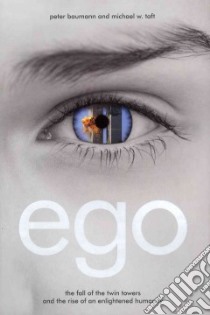Ego - 9781604075731
Un libro in lingua di Peter Baumann Taft Michael W. edito da Sounds True, 2011
- € 22.30
- Il prezzo è variabile in funzione del cambio della valuta d’origine
Baumann and Taft skillfully weave eyewitness accounts of 9/11 with insights from evolutionary theory, neuroscientific studies on brain plasticity and emotion, genetics, and other new areas of research. I highly recommend this book to all who are interested in how science can help in understanding both the human capacity for horrific action and the clear reasons for optimism about our collective future.Alfred W. Kaszniak, Ph.D., Professor of Psychology, Neurology & Psychiatry, University of Arizona Ego: The Fall of the Twin Towers and the Rise of a New Humanity by Peter Baumann and Michael W. Taft is the first book to explore the positive evolutionary potential hidden in one of the most destructive events in history. In their examination of the evolutionary implications of 9/11 and its aftermath, the authors contend we are not falling into the grip of a new dark age at all, rather we are on the verge of a much brighter one as the Darwinian process of natural selection continues to advance humankind.Peter Baumann began his career as a member of the massively successful 1970s band Tangerine Dream and later founded the Private Label record label. Instead of being derailed by early fame and fortune, he asked himself this question in his late forties: "If I have only 10,000 days left on the planet, what will I do with that time?"; Baumann put his resources to work exploring the source of human conflict and suffering with some of the greatest living scientists and students of consciousness, assembling a top-notch interdisciplinary think tank in the process. Michael W. Taft, a long-term student of meditation, psychology, and the history of evolution, brings rigorous research to the subject of human experience. The authors inquiry led them to the roots of human suffering: the ego. That the ego underlies our problems as a species may come as no surprise. But a deeper look into the ego's origin and history is full of unexpected revelations:The modern human is dominated by a Stone Age brain; Energy consumption and the environmental crisis is nothing more than the evolutionary drive to survive gone haywire; Evolution has wired us to be riveted to bad news, bad outcomes, and worst-case scenarios; When beliefs are challenged it triggers a life or death stance in the human nervous system; Emotions are mostly physical, not mental The self we identify with "along with its biases and beliefs" turns out to be an evolutionary tool that made its first appearance some 50,000 years ago during what's called the conceptual revolution, arguably the biggest developmental leap in human history. The emerging ego accompanied our ability to construct complex tools, create art, and redefine social structure. For the first time as a species, we were able to imagine the future, consider the thoughts of others, and picture ourselves in our own minds. The ego is a cognitive trick of natural selection intended to insure the survival of the individual. Baumann and Taft say the problem comes when we take the ego's conceptualization of reality as the truth about who we actually are. The ego has locked humanity in a trap that Albert Einstein identified: A human being is a part of a whole, called by us "universe", a part limited in time and space. He experiences himself, his thoughts and feelings as something separated from the rest... a kind of optical delusion of his consciousness. This delusion is a kind of prison for us, restricting us to our personal desires and to affection for a few persons nearest to us. Our task must be to free ourselves from this prison.Using the latest research from neuroscience, evolutionary biology, psychology, and paleontology, Baumann and Taft show that modern humanity may be on the verge of an expansion of cognitive abilities akin to the development of the ego. This next step will free the human mind to see beyond the confines of the prison, and open the vast potential of conscious awareness.
Informazioni bibliografiche
- Titolo del Libro in lingua: Ego
- Sottotitolo: The Fall of the Twin Towers and the Rise of an Enlightened Humanity
- Lingua: English
- Autori : Peter Baumann Taft Michael W.
- Editore: Sounds True
- Collana: Sounds True (Hardcover)
- Data di Pubblicazione: 28 Agosto '11
- Genere: SCIENCE
- Argomenti : Emotions Enlightenment Humanity
- Pagine: 273
- ISBN-10: 1604075732
- EAN-13: 9781604075731


